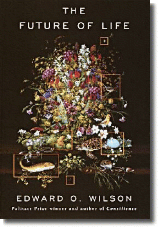His frame of reference:
There's a tendency among some to think of wildlife writing as being a waffly little affair that rambles on about otters or daffodils or babbling brooks, while the rest of us get on with something a good bit meatier like a juicy novel or a well-researched biography. How wrong that thinking is. It is our relationship with the natural world that over the millennia has formed us, informed us, and shaped the way we live and, when we are disconnected from it, we are left with a hollow void into which pour stress, depression and a vague sense of meaninglessness. Good wildlife books don't just tell us about wildlife, they tell us about the people who wrote them, and most importantly, they tell us about ourselves.Here are two of his picks:

Click here to read about his other eight choices--and his explanation for why Darwin's Origin of the Species got bumped from the list.How to be a Bad Birdwatcher by Simon Barnes
You know the feeling: you're reading a book, and as you turn every page you're nodding in agreement, as if the writer has popped into your head and committed your own thoughts to paper. This is one of books. It's about being a normal birdwatcher, reasonably knowledgeable, constantly passionate, but often a bit confused as to what you've seen or heard, and with the vague feeling that everyone else you're with knows so much more. It's the book for those of us who find birdwatching pleasurable, not competitive, and it's terribly funny to boot. I always smile, now, when I see a sparrowhawk. I urge you to read this book to find out why.
The Future of Life by E.O. Wilson
Talking of Wilson, here's a fascinating book that he brought out in 2002 which is a great example of conservation-based writing. The ecological debate will always rage on--should mankind continue to experiment with new sciences and discoveries, or are we destroying our world and ourselves in the process--and Wilson gets to the heart of the arguments superbly, driven by a constant love of the animals with which we share the planet. Agree with him or not, he's a stimulating writer and this is a stimulating book.
It appears that Going, Going, Gone? is not scheduled for U.S. release anytime soon, but here's what his publisher says about Animal Tragic:
Crocodiles lure unsuspecting, sympathetic victims towards them by crying. Hedgehogs steal apples by collecting them on their spikes.--Marshal ZeringueThe chronicle of natural history is absolutely littered with mistaken notions like these, some embarrassing, some bizarre, and some downright hilarious. How did these fantasies ever come about? Take a look at a bevy of bestial booboos, wildlife no-nos, and artistic animal atrocities and discover the reality behind each myth. Among the astounding beliefs: that swallows hibernate under riverside mud (which explained their winter absence); that lemmings hurl themselves over cliffs (blame that one on Walt Disney); and that some creatures could kill with just a glance. Plus, there's a look at misconceptions from everyday speech—including "blind as a bat." (They're not!)






